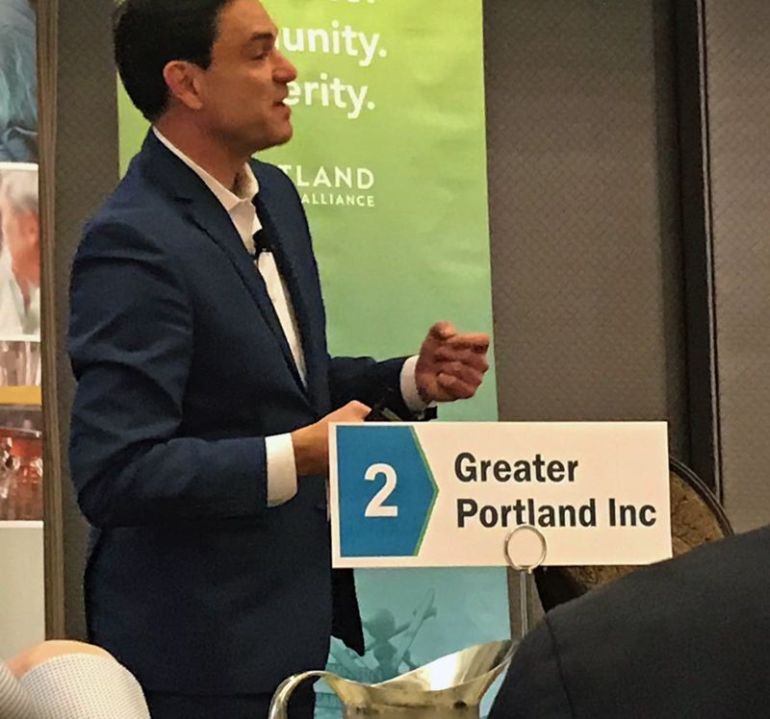PORTLAND, Ore. (PORTLAND TRIBUNE) — The City Council is considering how to spend the remaining $67 million of Portland’s first-year federal American Rescue Plan Act funding.
Commissioner Dan Ryan is proposing that $20 million be spent to establish six “managed safe rest villages” for homeless people in different parts of town. They would include case management services, showers, bathrooms and laundry facilities.
Ryan is preparing on ordinance for the City Council to consider as early as next week with more details, possibly including the recommended locations. He hopes construction will begin by August and they will open by the end of the year.
The city is already funding three managed camps, two in inner Southeast Portland and one near Union Station in Northwest Portland.
Other proposals include funding retraining programs for workers who lost their jobs during the pandemic-related recession.
The discussion began during a council work session on Thuesday, May 25. The council has already used $36 million of the $104 million allocation to help balance the budget for the next fiscal year that begins on July 1. The city expects to receive an additional $104 million next May.

During the work session, the council was presented with a series of options submitted by city bureaus and screened by an Economic Relief and Stabilization Coordinating Council comprised of top Portland officials in consultation with 75 community-based organizations and others.
John Tapogna, president of the ECONorthwest economic consulting firm, also presented a report on maximizing rescue plan investments. Tapogna said they are 62,600 fewer jobs in Multnomah County than before the start of the recession. But he also said residents, businesses, nonprofits and governments are scheduled to receive around $4 billion in emergency assistance and stimulus funds since the start of the recession.
When scaled to match the available funds, the largest proposal was $17 million for homeless services, including new camps and rest areas, alternative shelters and wrap around services. That would double the $17 million in next year’s budget that was approved by the council on May 13.
Commissioner Jo Ann Hardesty questioned whether any of those funds would go to the Portland-Multnomah County Joint Office of Homeless Services. Hardesty said she did not believe the county supported creating new camps and shelters that could quickly reduce the number of people living in tents on city sidewalks.
Commissioner Dan Ryan, the council liaison to the joint office, said the city is negotiating with the county over the issue.
Ryan and County Chair Deborah Kafoury released a joint statement Thursday evening pledging cooperation to end homelessness, including creating more shelters. Ryan said that he had requested $20 million in rescue plan funds for the managed villages during an online town hall with county and state leaders that evening. He elaborated on it during a meeting of A Home for Everyone, an advisory committee that includes many social service providers, the next day.
The second largest proposal was $13 million for housing stabilization, which includes rent assistance. Tapogna surprised the council members by saying they should be cautious about spending any more money on rent assistance, even though the eviction moratorium is set to end on June 30. Tenant advocates say 90,000 households in the state are at risk of losing their homes after that.
But Tapogna said federal, state and local governments already have committed enough funds to pay much if not all of the back due rents. He said the best estimates of unpaid rents in Multnomah County ranged from $72 million to $242 million in March. That compares to $210 million set aside in various funds for renters and landlords.
The largest organizations representing landlords — who prefer to be called housing providers — agree that much of the money needed to pay back rents already has been set aside. But they argue that relatively little of it has been distributed to date because of problems ranging from failed application websites to overly restrictive qualification requirements for funding. The organizations are Multifamily NW, the Rental Housing Alliance and the Oregon Rental Housing Association.
The Portland Housing Bureau estimates that the amount of unpaid rents in the county now is closer to $500 million, however, or more than twice the amount of committed rental assistance there.
The Oregon House Committee on Housing is expected to hold an informational hearing on the issue with the most up-to-date figures and on Friday, June 4.
Other proposals presented to the council included support for businesses ($11 million), workforce development ($4 million), community safety ($4 million), arts and culture ($2 million), and graffiti, vandalism and trash removal ($1 million). But Tapogna recommended the council also consider other ideas for spending some of the rescue plan money, including funding what he called “a limited number of larger, transformative investments” in the $10 million to $30 million range.
“This is a rare opportunity. You are not going to see another $4 billion rushing into the city,” Tapogna said.
Another work session on the proposals will be scheduled for July. The final decisions could be made that month or in August.
The Multnomah County Commission is scheduled to approve its budget for the next fiscal year on Thursday, June 3.
